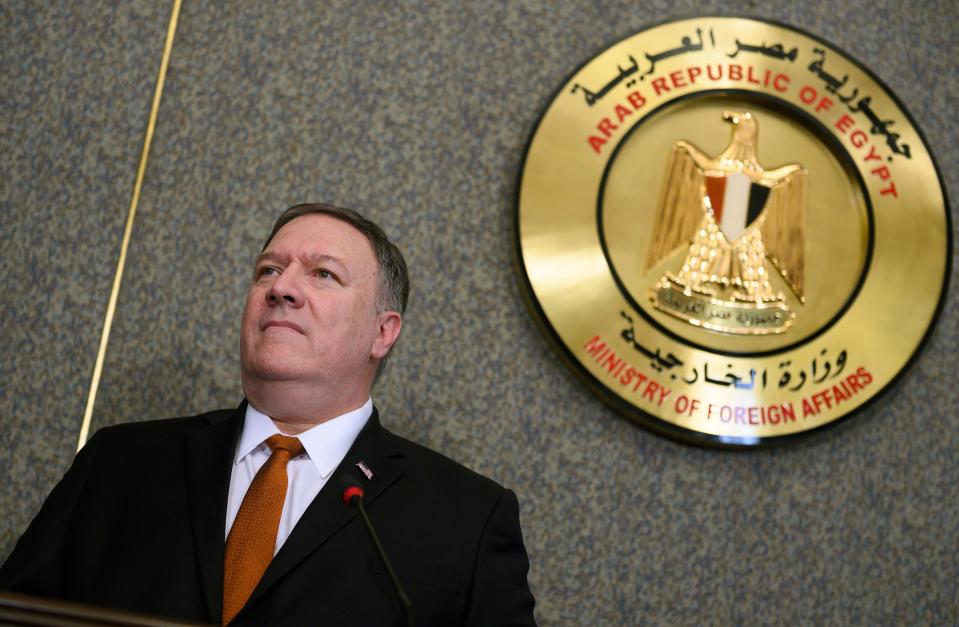'The age of self-inflicted American shame is over,' Pompeo declares in rebuke of Obama's policy
Secretary of State Mike Pompeo delivered a blistering rebuke to former President Barack Obama’s Middle East policy Thursday and argued that the Trump administration has "reinvigorated" and "rebuilt" America’s leadership role in the region – even as President Donald Trump’s own statements and policies have sown confusion and chaos there.
“The age of self-inflicted American shame is over, and so are the policies that produced so much needless suffering,” Pompeo declared in a major speech in Cairo, aimed at calming jittery allies after Trump’s abrupt decision to withdraw U.S. troops from Syria.
"Now comes the real 'new beginning,'" Pompeo said, putting his own spin on a phrase Obama used in his own sweeping speech in Cairo ten years ago.
In that 2009 speech, Obama sought a "new beginning" between the United States and the Muslim world. He pledged a relationship "based on mutual interest and mutual respect."
Pompeo said that vision was timid, misguided and created a vacuum that allowed ISIS to flourish and Iran to spread its "cancerous" influence in Syria and elsewhere. He glossed over Obama’s role in assembling a multilateral coalition to fight ISIS and pivoted sharply away from the former president’s efforts to press Arab allies on human rights abuses.

Indeed, Pompeo used his remarks to praise Egypt’s president, Abdel Fattah el-Sissi, who had led a brutally repressive regime – detaining thousands of dissidents, imprisoning journalists and sharply restricting freedom of expression. Pompeo thanked el-Sissi for his "courage" in confronting Islamic extremism and only obliquely mentioned the Egyptian leader’s crackdown by encouraging him to "promote a free and open exchange" of ideas.
Pompeo directly raised Trump’s decision to withdraw America’s 2,000 troops from Syria, saying "now is the time" for them to come home. That decision has raised concerns across the Middle East, particularly in Israel, about America’s commitment to stability in the region. It has also sparked a bitter rift with Turkey, a NATO ally, as the U.S. presses President Recep Erdogan not to attack the Kurdish fighters who have helped American troops fight ISIS in Syria.
Pompeo did not address the ongoing confusion about how quickly that U.S. withdraw would happen, but he did say that U.S. airstrikes would continue as needed.
"As the fighting continues, we will continue to assist our partners in efforts to guard borders, prosecute terrorists, screen travelers, assist refugees and more," Pompeo said. "But 'assist' is the key phrase. We ask every peace-loving nation of the Middle East to shoulder new responsibilities for defeating Islamist extremism wherever we find it."
Earlier this week, Trump national security adviser John Bolton said the U.S. would not withdraw from Syria until the last remnants of ISIS was defeated, the Syrian Kurds were protected, and any Iranian-backed forces were driven out. Achieving those goals could take months, suggesting a protracted presence of American forces, experts have said.
Syria: As Trump's timeline for withdrawal slips, U.S. allies are nervous, angry, confused
Capitol Hill: Low-key Sen. James Risch contrasts combative Corker on Foreign Relations Committee
This article originally appeared on USA TODAY: 'The age of self-inflicted American shame is over,' Pompeo declares in rebuke of Obama's policy

